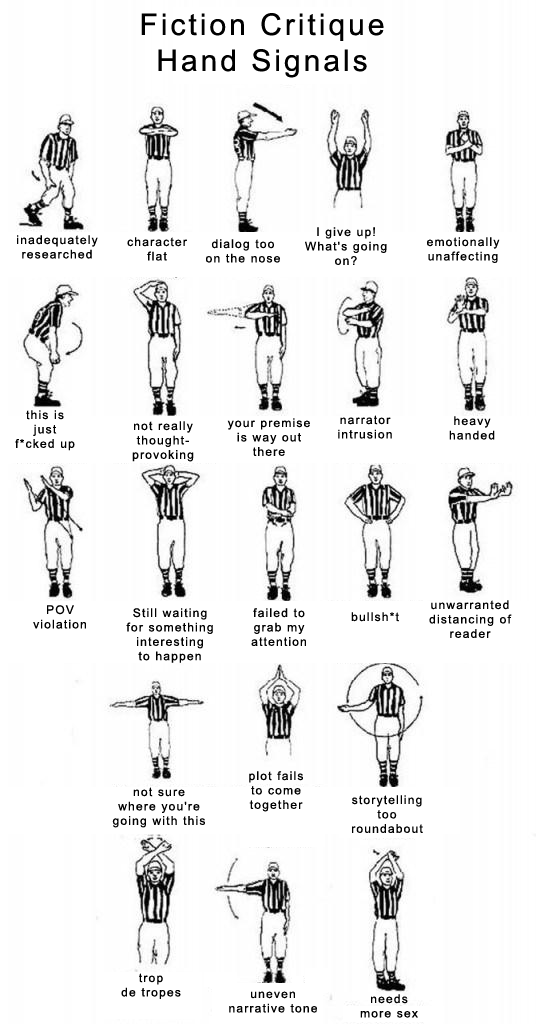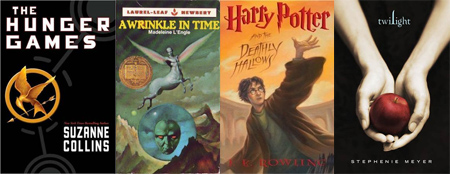For live critiquing:

credits
Images: don’t know; didn’t ask
Nonsensical captions: me
For live critiquing:

credits
Images: don’t know; didn’t ask
Nonsensical captions: me

In August 2011, my short play “The Discovery of Fire (and Other Bad Ideas)” was performed for the first time in Waitsfield, Vermont’s Valley Players theater as part of the 4th Annual Vermont Playwrights’ Circle TenFest of short plays. After a bit of a delay, it’s now available to watch on YouTube.
In “The Discovery of Fire,” a tribe of cavepeople try to come to grips with a freakish new phenomenon discovered by their tribesmate, Bluk.
Alex Shvartsman recently launched a Kickstarter project to aid in the creation of an anthology of science fiction humor from pro authors. It wasn’t until he mentioned his plan in a discussion that I realized I had never seen such a thing, and yet it’s a simple and appealing idea–an idea with legs, as they say.
So I made my first-ever Kickstarter contribution and asked Alex if I could interview him about the book. Here is that interview.
LUC: You’ve had some noticeable success both in writing (with sales to major markets like DSF and Nature) and in the gaming world. What made you venture into editing and publishing an anthology by pro writers?
 ALEX: Although I really enjoy reading and writing speculative fiction, I’m a businessman at heart. I’ve launched several different companies over the years and it’s difficult for me to look at a business model without the question of “how would I do this differently” lingering at the back of my mind.
ALEX: Although I really enjoy reading and writing speculative fiction, I’m a businessman at heart. I’ve launched several different companies over the years and it’s difficult for me to look at a business model without the question of “how would I do this differently” lingering at the back of my mind.
One of the first things I learned upon trying to get published is that content is way underpriced. Incredibly talented people work very hard to let someone publish their words for pennies per word. So why not put my business acumen to good use and let that someone be me? Even paying what’s considered pro rates I feel that I’m taking advantage of the authors, somehow. I hope to be able to pay even more, eventually, if UFO Publishing becomes a success.
Mind you, I’m not saying that I know better than anyone else, or that the way other publishers do things is somehow bad or wrong. Small publishers that make such claims come and go, and that sort of a statement is often a warning sign in itself. All I’m saying is that I’m willing to invest my time and money to put together the best book I possibly can, and see where that takes me.
LUC: Interesting. So with that in mind, why funny science fiction in particular?
ALEX: I love writing and reading light, humorous stories. Stuff that may be fun to read but won’t necessarily be considered by some of the SFWA markets. When trying to submit such stories for publication I’ve been frustrated at the lack of pro paying venues where they would fit, and realized that, surely, I’m not alone in this.
Can you think of an anthology of speculative humor published any time recently? A publisher that specializes in such material? I can’t. Yet Terry Pratchett books and, recently, “Redshirts” by John Scalzi are bestsellers. So why not short SF/F stories, too? I believe there is a market for such books, and it may be a great niche for a fledgling company to fill.
LUC: How did you decide on a Kickstarter campaign for initial funding, and how did you address the perennial question “why is this book project worth supporting”?
ALEX: Kickstarter is a perfect platform for projects like this. It isn’t just about the money raised (though the money certainly helps!) – it’s about proof of concept. How many people will become excited enough about an anthology of humorous SF/F to support it by pre-ordering a copy, or even pledging extra money for other rewards? How many people will I be able to reach, make aware of the upcoming book, that might not have learned about it otherwise? This is marketing with an added benefit or raising money for a new venture rather than spending money. A godsend for any bootstrapping new publisher.
So far, I’m very pleased with the results. Over 125 individuals backed UFO in the first three weeks. Hundreds more learned about it through social media and are at least aware of the book, even if they didn’t elect to pre-order. By the time the crowdfunding campaign is over in September, the numbers it generates will give me a much better idea of how many physical copies of the book to print, how much to spend on advertising, etc. And, of course, an infusion of cash at this stage is supremely helpful.
As to the reasons to support the project, there are many. If you are a reader/fan who enjoys speculative humor then, I will repeat once again, UFO is the only anthology of this kind being released in the foreseeable future and supporting it helps promote light/humorous SF and support authors. If you’re a writer, you will find UFO’s systems and procedures to be very friendly — we respond to all submissions within 1-2 days, often provide personalized feedback, pay pro rates, don’t demand excessive rights, pay promptly upon contract … I can go on!
LUC: How have the submissions you’ve received so far–and especially the stories you’ve bought for the anthology–compared with what you expected? What exactly are we in for, here?
ALEX: Both the quantity and the quality of the submissions far exceeded my expectations. There have been over 750 submissions already and way more of them are excellent stories than what I can hope to squeeze into the book.
Let me tell you about just a few of the yarns that will appear in UFO. There’s a novelette by Mike Resnick about a spell-casting Albert Einstein battling the Nazis with some help from Eleanor Roosevelt. Ferrett Steinmetz writes about a wizard who powers his spells through tantric masturbation. This story is a lot more PG-13 than you might expect but still, it isn’t something you’re likely to read elsewhere.
There are also stoned computers, down on their luck vampires, omnivorous sex-maniac pandas and a zombear.
Not every story is over-the-top slapstick humor. Some are gentler, light tales, like Stephanie Burgis’ “Dreaming Harry” about a child whose dreams literally come true and the parents forced to deal the consequences of that. Or Nathaniel Lee’s “The Alchemist’s Children” about a scientifically-minded daughter’s quest to reconnect with her alchemist father. I am going for variety, but I try to avoid dark humor and humorous horror. I want the tone of the book to be very optimistic.
A great example of what’s to be found in the book is Jake Kerr’s story of an alien invasion told via Twitter. We posted it for everyone to read for free, and coded the page to look just like a Twitter stream. It can be found here:
http://www.ufopub.com/twitter .
Let me leave you with that, because Kerr’s story is worth reading and probably a good litmus test for whether or not this book is for you. At the time of this writing, the Kickstarter project is more than 70% funded with a week to go (though less by the time you read this).
Daily Science Fiction, in case you don’t already know about it, posts one short speculative fiction story each weekday. E-mail subscribers get the stories first (subscriptions are free, by the way), and they appear on the Web site a week later. Editors Michele Barasso and Jonathan Laden showcase some major names and great talent among science fiction and fantasy writers. Often their stories are beautiful, poignant, and deeply meaningful. Today … not so much.
Fortunately for me, given that every once in a while I’m gripped with the need to write a story on some humorous (or at least intended-to-be-humorous) topic, they also publish some humor, like my story “Dear Editor, Enclosed Please Find My Story About Your Unfortunate Demise,” which appears on the site today. I wrote this story because I really wanted to send a submission that began “Dear Editor, enclosed please find my story ‘Dear Editor, Enclosed Please Find My Story About Your Unfortunate Demise.'” Why? That, my friends, is a question I am unlikely to understand any time soon.
I hope you enjoy the story and get a chance to dig into some of the marvelous work in the Daily SF archives.
Today’s XKCD cartoon shows that internal commentary I talk about, and (as usual) manages to be really entertaining to boot (at least, to me, having experienced situations like this):
My favorite line in there is “I hope he doesn’t ask me what his name is.” It’s taken a real effort over the past ten years or so for me to get comfortable with admitting I don’t remember someone’s name. I’m mostly there now, though. Mostly.
Anyone wanting to do something about this kind of experience might be interested in the page on this site about Broken Ideas and Idea Repair.
Harry Potter, The Hunger Games, Twilight, even A Wrinkle In Time … technically, these books were never meant for those of us over the age of 18 or so. As Young Adult (or in the case of Harry Potter, Middle Grade) fiction, they were intended for the younger generation, and yet adults–by which I mean possibly you and definitely me–are still reading them by the bookmobileful. I think we’re supposed to be reading more serious stuff–maybe The Grapes of Wrath, or Moby Dick … War and Peace is probably good. I always tell people I’m reading War and Peace, and I’m at that part right near the end. This helps make sure they’ll change the subject quickly so that I don’t have to prove I don’t know what it’s about. Except, you know, obviously war, and also peace. Probably there’s something there about Russia invading … I don’t know, somebody. Maybe Russia invading Russia. Russia is pretty big: they could probably get away with that.

Anyway, my point is that it’s not always impressive and mature-sounding to say “Oh, I just read this great book written for 12-year-olds …” Here, as a public service, are some excuses writers and readers can use to cover for an addiction to young adult fiction.
Ah, brains: so mysterious, complicated, and powerful, and yet so inclined to tell us to sit on the couch and eat doughnuts instead of doing the dishes or working out. What’s with these things, anyway?
There’s a group of neurons deep in the heart of the brain called the basal ganglia, and they’re involved in some important functions like movement and habit formation. How does the habit formation part work? Kind of a like a big, stupid, friendly guy, who’s only too willing to help but needs to be shown what to do over and over. And over. And over again. You get the idea.
So if I’m out here wanting to develop a habit of remembering someone’s name the first time it’s said by always repeating it and using a mnemonic, and if I try that once or twice, the basal ganglia–our big friend–are going to be staring at me dully, wondering exactly what I’m getting at. But if I stay aware with post-it notes or constant vigilance or a string tied around my finger, and if I keep at it, eventually he’ll get a glimmer of understanding in his eye (though it obviously the basal ganglia don’t really have eyes–that would be creepy) and try to follow along, hesitantly and with some confusion. And if I keep introducing myself to enough new people (perhaps volunteering at the membership table of a stamp collecting convention, if that’s what it takes), and remember to always say the name over silently and come up with a mnemonic, then he begins to get in the groove and really starts to learn to do what I’m doing.
But then let’s say I’m tired after the stamp collecting convention. I go to a diner for a nice tomato sandwich, and when the waitress introduces herself as Evangeline, I’m just too tired to memorize her name. Suddenly the big guy lurches to a stop. He thought I was doing the thing with the repeating and the mnemonics, and now I’m doing the thing with the tomato sandwich, which is a little too many for him. So he waits for a clue.
Then five minutes later someone comes up and says “Hey, you were at the stamp convention! Did you get a load of those Cinderellas? Man!” He introduces himself as Larry.
This is it. I’ve already blown it with Evangeline, and Larry here is my Waterloo: the only question is whether I’m the guy who won at Waterloo or the guy who lost (yeah, I know their names, but if we get bogged down in details this article is going to run 1,500 words before we’re done, and nobody wants that).
So maybe I look at Larry and silently repeat the name “Larry” to myself, then think, “You know, he’s the kind of guy who looks like he would have a lair.” (Lair-Larry: that’s my mnemonic. And don’t give me that–I never said it had to be a clever mnemonic.) In this case the big dumb guy (the basal ganglia, not Larry: Larry’s like, 5’6″, not to mention he got a 1710 on his SAT’s) smiles angelically and lumbers forward again. He understands: this is a habit he and I are trying to form, and the thing with what’s-her-name the waitress, Angelina or Emmaline or whatever, was just a glitch. As long as there are very, very few glitches and lots of Larry experiences, the basal ganglia guy will put more and more of his massive strength behind reinforcing my name-remembering habit. And if I keep that habit up every day or very nearly every day, in just 18-254 days, give or take, it should be completely locked in! Now was that so hard?
OK, it was hard–for maybe two or three months (68 days on average, according to one study). But for the rest of my life, or until I start getting old and confused and calling everyone “Josephine,” I’ll be a champion name-rememberer, and people will look at me with awe and say “Boy, I wish I could remember names like that. I guess some people can just naturally do it and some people can’t.”
And even while I’m smacking my forehead in dismay at such people, the big dumb guy is happily shoving their names into long-term memory for me, unconfused and at peace.
Photo by Olivander
 I don’t know about you and me, but it’s clear as that unopenable, molded plastic they package everything in these days they everybody else is pretty screwed up. I mean, come on: suburban sprawl? Pollution? The fashion trend where your jeans have to be all discolored and ripped up? Geraldo Rivera? Everybody Else may think they don’t have a problem, but it’s pretty obvious they’re fooling themselves.
I don’t know about you and me, but it’s clear as that unopenable, molded plastic they package everything in these days they everybody else is pretty screwed up. I mean, come on: suburban sprawl? Pollution? The fashion trend where your jeans have to be all discolored and ripped up? Geraldo Rivera? Everybody Else may think they don’t have a problem, but it’s pretty obvious they’re fooling themselves.
Case in point: the near-annihilation of all of the Native American nations. They had Europeans going around and enslaving people, stealing their stuff, giving them infected blankets, shooting them, breaking agreements, taking their land, telling them to clear off and go live in the desert … all kinds of injustice. Then later, as if to add insult to injury, they make it so the only way they can make their living is by running casinos. I know I wasn’t there to do any of that stuff, and I bet there’s at least a 96 to 97 percent chance you weren’t, either.
Now, this is kind of hard to reconcile. I mean, it’s clearly a good thing to take responsibility for our own lives and how they go, but what about all this stuff other people have done to mess us up (and right when things seemed to be going pretty well for once, too)? Don’t we have enough of our own issues to deal with without having to put up with that nonsense?
Clearly Everybody Else needs help. Now, you know Everybody Else: it’s really hard to get in a meaningful conversation with them, and when you do, they kind of mumble and end up wandering off to play Halo or get their hair frosted or something. The problem with Everybody Else is that they just don’t listen! If you’ve ever tried to gently instruct people in the art of more considerate driving by revving your engine and honking your horn at them, you’ll know what I mean.
Unfortunately, that leaves you and me holding the bag, my friend. If Everybody Else won’t get help, then we’re going to have to do one of those perspective shifts and consider ourselves part of Everybody Else, then get some help ourselves. As close as we are to perfect, we can probably come up with at least a few things that could stand improvement, and if we look at it that way, then at least Everybody Else is getting somewhere. Maybe some of them will even kind of notice what we’re doing and try to follow along. No, seriously, it could happen.
Why it should be left to you and me to be part of Everybody Else and improve, subjecting ourselves to potential arch comments when we consult self-help materials or to pride-swallowing when our pride really isn’t going down too smooth in the first place, I don’t know. But as much of a pain in the butt as Everybody Else is, we really do love them (or at least certain ones of them we know), and a touch of self-sacrifice every now and again won’t kill us. After all, we’re pretty chill, you and me: we can handle it.
Photo by Idhren
![]() Nadia sent me
Nadia sent me ![]() this (which amused me), and with no conscious intention I ended up writing the following:
this (which amused me), and with no conscious intention I ended up writing the following: